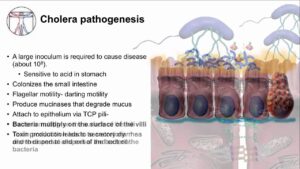Can Infection Cause Diarrhea? Understanding the Relationship between Infections and Digestive Health: Diarrhea, characterized by loose or watery stools, commonly affects millions worldwide. Various factors, including infections, can cause it. Infections are caused by microorganisms such as bacteria, viruses, and parasites that enter the body and disrupt its normal functioning.
This article will explore the relationship between infections and diarrhoea, understanding how infections can cause it and what steps can be taken to prevent and manage it.
Understanding Infections and Diarrhea:

Infections are a leading cause of diarrhoea. They can occur through various means, including ingesting contaminated food or water, direct contact with infected individuals or surfaces, and poor personal hygiene practices. When these microorganisms enter the digestive system, they can disrupt the normal functioning of the gastrointestinal tract, leading to diarrhoea.
Bacterial Infections and Diarrhea:
Bacterial infections are a common cause of diarrhoea. Bacteria such as Escherichia coli (E. coli), Salmonella, Shigella, and Campylobacter cause gastrointestinal infections that can lead to diarrhoea. These bacteria can enter the body through contaminated food, water, or surfaces.
Once inside the gastrointestinal tract, they can multiply and cause inflammation and irritation of the lining of the intestines. This can lead to increased fluid secretion and reduced water absorption from the intestines, resulting in loose or watery stools.
Viral Infections and Diarrhea:
Viral infections are also a common cause of diarrhoea. Viruses such as norovirus, rotavirus, and adenovirus cause gastrointestinal infections that can result in diarrhoea. These viruses can be transmitted through contaminated food or water or direct contact with infected individuals. Once inside the body, they can infect the gastrointestinal tract cells, leading to inflammation and damage. This can disrupt the normal functioning of the intestines, resulting in diarrhoea.
Parasitic Infections and Diarrhea:
Parasitic infections can also cause diarrhoea. Parasites such as Giardia lamblia, Cryptosporidium, and Entamoeba histolytica cause gastrointestinal infections that can result in diarrhoea.
These parasites can be ingested through contaminated food or water, and once inside the body, they can invade the lining of the intestines, causing inflammation and damage. This can lead to increased fluid secretion and reduced water absorption, resulting in diarrhoea.
How Infections Cause Diarrhea:
Infections can disrupt the normal functioning of the gastrointestinal tract in several ways, leading to diarrhoea. These include:
Inflammation:
When microorganisms enter the gastrointestinal tract, they can trigger an immune response, leading to inflammation of the lining of the intestines. This inflammation can disrupt the absorption and secretion of fluids in the intestines, resulting in diarrhoea.
Increased Fluid Secretion:
Some microorganisms can stimulate the cells of the gastrointestinal tract to secrete more fluid than normal. This can increase fluid accumulation in the intestines, resulting in loose or watery stools. There are a few different possible causes of this symptom. One possibility is that the microorganisms are stimulating the cells in the intestines to secrete more fluid. Another possibility is that the microorganisms are causing inflammation in the intestines, which can lead to fluid accumulation.
Reduced Fluid Absorption:
Infections can also interfere with the normal absorption of fluids from the intestines. This can increase fluid content in the stools, leading to diarrhoea. Infections can also interfere with the normal absorption of fluids from the intestines. This can increase fluid content in the stools, leading to diarrhoea.
Damage to Intestinal Lining:
Microorganisms can damage the lining of the intestines, disrupting their normal structure and function. This can affect the absorption and secretion of fluids in the intestines, leading to diarrhoea. Infections of the intestines can also cause inflammation, leading to diarrhoea. Parasites, such as Giardia lamblia, can also cause diarrhoea.
Prevention and Management of Infection-Related Diarrhea:

Preventing and managing diarrhoea caused by infections requires a multi-faceted approach. Here are some strategies that can be employed:
Proper food and water hygiene:
Ensuring that food and water are safe to consume prevents infections that can cause diarrhoea. This includes washing hands thoroughly before handling food, properly storing and cooking food, and avoiding consuming raw or undercooked food. Drinking clean and safe water, preferably from trusted sources, is also important.
Personal hygiene practices:
Practising good personal hygiene, such as regular handwashing with soap and water, can help prevent the spreading infections that can cause diarrhoea. This is especially important after using the toilet, changing diapers, and handling food.
Avoiding contact with infected individuals:
Avoiding contact with individuals who are known or suspected to have an infection that can cause diarrhoea can help prevent the spread of the infection. This includes avoiding close contact with individuals who have symptoms of gastrointestinal infections, such as vomiting or diarrhoea.
Vaccination:
Vaccination can be an effective strategy to prevent infections that can cause diarrhoea. Vaccines are available for viral and bacterial infections, such as rotavirus and cholera, which can cause diarrhoea, and getting vaccinated according to recommended schedules can protect against these infections.
Proper sanitation:
Ensuring access to proper sanitation facilities, such as clean toilets and sewage disposal systems, can help prevent contamination of food and water sources, reducing the risk of infections that can cause diarrhoea.
Treatment of infections:
If an infection is suspected or diagnosed as the cause of diarrhoea, appropriate treatment should be initiated as per medical advice. This may include antibiotics for bacterial infections, antiviral medications for viral infections, and antiparasitic medications for parasitic infections.
Rehydration:
Diarrhoea can cause dehydration due to the loss of fluids from the body. Rehydration is an important part of managing infection-related diarrhoea. Oral rehydration solutions contain a proper balance of salts and sugars and can replace lost fluids and electrolytes. In severe cases, intravenous fluids may be required.
Seeking medical advice:
Suppose diarrhoea persists or is accompanied by severe symptoms, such as high fever, bloody stools, or signs of dehydration. In that case, seeking medical advice promptly for appropriate evaluation and management is important.
What stops diarrhoea fast?
Diarrhoea is a common condition that results in loose, watery bowel movements. Various factors, such as viral or bacterial infections, food poisoning, medications, stress, or underlying health conditions, can cause it. If you are experiencing diarrhoea, staying hydrated and replenishing lost fluids and electrolytes is important. Here are several methods that can help stop diarrhoea fast:
Oral rehydration solution (ORS):
ORS is a specially formulated solution that contains a precise balance of electrolytes (such as sodium, potassium, and chloride) and sugar to help replenish fluids and electrolytes lost during diarrhoea. ORS is available over-the-counter in most pharmacies and can be an effective way to rehydrate and stop diarrhoea.
Fluids:
Drinking fluids, especially water, is crucial to replace the fluids lost due to diarrhoea. Avoid caffeinated beverages, alcohol, and sugary drinks, which can worsen diarrhoea and lead to dehydration. Clear broth, herbal tea, and coconut water are good options for replenishing fluids.
BRAT diet:

BRAT stands for Bananas, Rice, Applesauce, and Toast, and it is a bland diet that can help firm up stools and ease diarrhoea. These foods are easy to digest and can help bind loose stools, making them a good option during episodes of diarrhoea. However, it’s important to note that the BRAT diet should not be followed for an extended period, as it may lack sufficient nutrients.
Probiotics:
Probiotics are beneficial bacteria that can help restore the balance of gut flora, which may be disrupted during diarrhoea. Probiotic supplements or foods such as yoghurt, kefir, and fermented foods like sauerkraut can help replenish the gut with good bacteria and aid in stopping diarrhoea.
Medications:
Over-the-counter anti-diarrheal medications such as loperamide (Imodium) and bismuth subsalicylate (Pepto-Bismol) can help reduce the frequency and severity of diarrhoea. However, it’s important to follow the dosage instructions and consult with a healthcare professional, especially if you have any underlying health conditions or are taking other medications.
Rest:
Diarrhoea can be physically exhausting, and rest is essential for your body to recover. Get enough rest to allow your body to heal and regain strength. If you are experiencing diarrhoea, drink plenty of fluids and avoid caffeine, alcohol, and smoking. Rest is also important to allow your body to heal and regain strength.
Identify and treat underlying causes:
Suppose diarrhoea persists or is accompanied by other symptoms such as fever, severe abdominal pain, or blood in the stool. In that case, it may indicate an underlying condition requiring medical attention. Identifying and treating the underlying cause, such as an infection or gastrointestinal disorder, is important in stopping diarrhoea fast.
If you have severe diarrhoea that persists for more than a few days or experience other concerning symptoms, you should seek medical attention promptly. Diarrhoea can cause dehydration, which can be dangerous, especially in young children, elderly individuals, or those with weakened immune systems. Always consult with a healthcare professional for proper evaluation and management of diarrhoea.
Conclusion!
In conclusion, infections caused by bacteria, viruses, and parasites can disrupt the normal functioning of the gastrointestinal tract, leading to diarrhoea. Preventive measures such as proper food and water hygiene, personal hygiene practices, vaccination, and access to sanitation facilities can help reduce the risk of infection-related diarrhoea.
Prompt treatment of infections and rehydration is important in managing diarrhoea caused by infections. Seeking medical advice for appropriate evaluation and management is recommended, especially in severe cases or when symptoms persist.
FAQs!
How do I know if my diarrhoea is from an infection?
Diarrhoea caused by infection is often accompanied by other symptoms such as fever, abdominal cramps, nausea, vomiting, and malaise. It may also be associated with recent exposure to contaminated food or water or a history of travel to regions with poor sanitation. In some cases, stool culture or other diagnostic tests may be needed to determine the exact cause of the infection.
Does diarrhoea mean your body is fighting an infection?
Yes, diarrhoea can signify that your body is fighting an infection. Diarrhoea is the body’s way of flushing harmful substances from the digestive tract, such as bacteria, viruses, or toxins. It is a natural defence mechanism of the body to help eliminate infectious agents.
How long does infectious diarrhoea last?
The duration of diarrhoea caused by an infection can vary depending on the type of infection, the severity of the infection, and individual factors. Viral infections may last a few days to a week, bacterial infections may last for several days to a few weeks, and parasitic infections may persist for weeks to months. Consulting a healthcare professional for an accurate diagnosis and appropriate treatment is important.
What does diarrhoea mean when you have an infection?
Diarrhea associated with an infection usually indicates that the body is trying to eliminate harmful pathogens from the digestive tract. It can signify that the immune system is actively fighting the infection.
However, diarrhoea can also cause dehydration and electrolyte imbalances, so staying hydrated and seeking medical attention if the symptoms persist or worsen is important. Treatment for infection-related diarrhoea may involve addressing the underlying cause of the infection, rehydration, and supportive care to manage symptoms.
Also Read
- lifetime-fitness-membership-prices-locations
- membership-levels-at-lifetime-fitness
- everything-you-need-to-know-about-la-fitness
- 40 Junk Food List | Healthy And Unhealthy Food
- Lifetime Onyx Membership: What Is It- Advantage & Price
- What is Ursolic acid? Benefits, Side effects and Supplements
- 5 Best Ingredients to Increase Testosterone Levels Naturally
- 6 Benefits of Biotin – How It May Protect Your Health
- Keto Diet Advantages And Disadvantages
